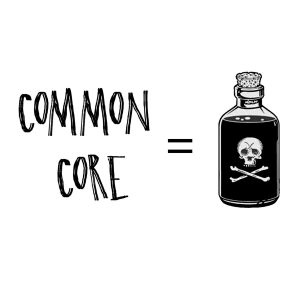
By Michaela Donato
Picture this: you’re an internationally ranked athlete with relentless competition in an increasingly difficult sport. What do you do? You reduce the number of times you practice, and the few times that you do practice, you’re screwing around.
Illogical, right? This is the policy the Massachusetts Board of Education, like 47 other states’ boards, is implementing in schools. And although recently Massachusetts rejected Common Core’s PARCC test, the Board is deceiving the state and simply hiding PARCC inside of its new MCAS 2.0.
According to the 2011 Trends in the International Mathematics and Science test—a globally accepted test evaluating fourth and eighth grade students in over 50 countries—Massachusetts’s mathematics system ranks sixth. Massachusetts’s exceptional performance in this assessment exemplifies how advanced its standards were compared not only to other countries but also to other districts within the United States, all of which Massachusetts outscored.
Beyond the fact that the state’s math department was entirely capable and even prolific in preparing students, as shown by its ranking, the transition itself to Common Core harms students. The entirety of this year’s Junior class (give or take a dozen in specialized programs) experienced the transition from Massachusetts’ old standards to Common Core’s standards in their eighth grade year. Subsequently, these students took Algebra I twice if not three times: as pre-algebra in seventh grade, as an integrated algebra in eighth grade and again as another type of integrated algebra in ninth grade. Reasonably so, these students felt like they were learning the same topics over and over again. Class of 2017 students in particular are trapped because the Common Core eliminates elements of the Pre-calculus course, like probability and sequences and combinatorics, that lay the groundwork for later advanced classes. If these students want to take calculus or physics or statistics, if they want to be competitive candidates in the college application process, if they want to be sufficiently primed for a variety of careers, they have to make an enormous jump to these ambitious classes, a jump that is nearly impossible for students who do not receive sufficient preparation from any of their Common Core integrated courses. Although the effects of Common Core are augmented for the class of 2017 because the students experienced the abrupt transition, even the class of 2018 feels the curriculum is repetitive—and they are completely immersed in Common Core.
Common Core likewise debilitates the English Language Arts. Common Core attempts to accommodate modernity’s fact-frenzy by centering English classes on nonfiction—specifically informational texts. The ability to comprehend and analyze these informational texts is becoming increasingly important; however, bombarding kids with lifeless material only discourages them and hinders development of a love for reading. In Worcester, due to Common Core, young students had to read their town’s Public Schools Policy Handbook for English class. What is more interesting to younger students: a policy handbook or a tale of wizardry and friendship? An elaborate explanation of taxation or a child’s historical account of the Holocaust? A packet of demographic data or a collection of insightful and clever poems?
So with kids’ reading rates declining in recent years, now, more than ever, inciting a love of reading is integral in preparing for more involved and mature texts.
Furthermore, it is impossible to ignore students’ ability to handle the advanced curricula Massachusetts used to have. Some on the vanguard of the pro-Common Core movement claim students in Massachusetts were not doing well enough. But yet, according to the Boston Globe’s 2013 article entitled “Are New Curriculum Standards Any Better,” more than 80 percent of students received scores above proficient on MCAS, the Massachusetts assessment that is significantly harder than any national tests.
As a junior, I have seen first-hand the negative effects of Common Core. I am in a different math program than my peers, so in that sense, I have watched my friends suffer in an unchallenging, discouraging environment since middle school and presently, am watching them struggle because Common Core robbed them of the foundation they need to succeed in high school level courses, forget college.
Simply put, in the aforementioned Globe article, Ze’ev Wurman (a presidential policy advisor) explains Massachusetts’ transition to Common Core: “You’re taking a system that worked very well and took more than a decade to put in place and essentially changing for a new system that at best is about as good—at best.”
Common Core claims to be adapting to what students need to know in the modern world. However, frankly, Common Core is not good enough for the students of Massachusetts.
Explain to Massachusetts students why instead of making advancements to reflect the changing world around us Common Core is worsening our education —the education that was once the best in all of the United States and one of the best in the world.














